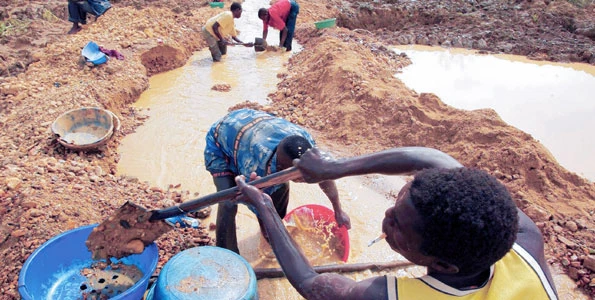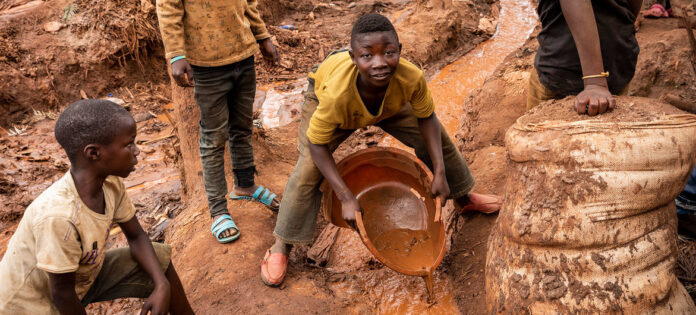By Cyrus Njonde
Nairobi, Kenya: In recent weeks, Kenya has witnessed a surge in activism led by Gen Zs, demanding gainful employment and a dignified existence in the country.
This generation, fearless and full of innovative ideas, is pushing for significant changes in governance. With 75% of Kenya’s population being aged between 18 and 35, their concerns and aspirations deserve the undivided attention of all economic sectors.
The rising youthful population presents a tremendous opportunity for economic transformation if effectively engaged.
Among the issues highlighted by Gen Z is the imperative for the government to become self-reliant, wealth-generating, and adept at managing debt.
Achieving this vision necessitates resource mobilization across all sectors, encompassing both financial and human capital.
Despite its potential, Kenya’s mining sector has not received significant attention, especially in media discussions on economic growth and job creation.

However, recent conversations on social media platforms, particularly on X (formerly Twitter), have spotlighted the sector’s potential. Discussions like “Minerals in Kenya that Do Not Belong to Kenyans” and “Is Kenya Poor by Choice or by Design?” have sparked interest among the youth, highlighting mining as a potential economic liberator.
“Youths in Mining” is emerging as a powerful concept, representing a generation poised to harness the nation’s mineral resources for unity and equity.
With Many of Kenya’s mineral-rich areas, such as Turkana, West Pokot, Baringo, Moyale, and Isiolo to mention but a few, being marginalized with extreme weather and accessibility challenges, The immense wealth of our nation requires a collaborative, multi-generational approach, involving all age groups to provide the necessary resources and skills.
Young professionals, including mining engineers, geologists, and geospatial experts, have organized themselves into societies such as the Mining Engineers Society of Kenya (MESK) and the Geology Society of Kenya (GSK).
They are ready to apply their expertise to drive the country’s economic growth through mineral exploitation. Employment remains a critical issue in Kenya, but the youth bring invaluable skills and professionalism to the extractive sector.
They can mitigate risks and ensure safe, efficient mining operations, essential for impactful projects led by the government or the private sector.
Modern technology and transparent governance are crucial in unlocking the full potential of Kenya’s mining sector. Kenya’s geological data, largely outdated since colonial times, requires modern updates.
The recent airborne survey is a step forward, but making this data publicly accessible is vital. The Gen Z advocates for transparent and accountable governance, insisting that such critical information should be readily available. The discussions on X highlighted the youth’s willingness to share significant insights about Kenya’s minerals, reflecting their demand for transparency.
Effective management of Kenya’s mineral wealth requires collaboration between generations. Young professionals should learn from seasoned experts to ensure knowledge transfer and sustainable exploitation of mineral resources. This synergy can eliminate gatekeeping and leverage readily accessible information to drive economic profitability.
In the context of Kenya’s burgeoning youthful demographic, it is essential to consider how this generation can drive the mining sector forward. Their fearlessness in demanding better governance and their readiness to leverage modern technology positions them as key players in transforming the sector.
One of the critical contributions of young professionals to the mining sector is their emphasis on professionalism and safety.
Unprofessional practices in mining have historically led to catastrophic incidents, causing loss of life and environmental damage. Young mining engineers, geologists, and geospatial experts are trained to adhere to stringent safety standards and can be pivotal in reducing such risks. Their involvement in mining operations can lead to more sustainable and responsible mining practices.
The use of modern technology, such as advanced geological mapping and AI, is critical in identifying and efficiently exploiting mineral resources.
Kenya has relied on outdated geological maps for decades, limiting the effectiveness of mineral exploration. Young professionals, with their expertise in modern technology, can lead the way in updating and utilizing these tools to unlock the country’s mineral potential.
The youth’s ability to transcend ethnic biases is crucial for the equitable distribution of mineral wealth. By fostering a sense of unity, they can help ensure that all regions benefit from mineral exploitation, regardless of ethnic or geographical differences.
This inclusive approach can lead to more balanced economic development across the country.
The future of Kenya’s mining sector lies in the hands of its youth. By embracing unity, rejecting ethnic biases, advocating for transparent governance, and leveraging modern technology, they can transform the sector into a major contributor to the nation’s GDP from the current 0.7% to 10% by 2030.
Gen Z, with their innovative ideas and technological prowess, can rewrite the narrative on mining in Kenya, making it a cornerstone of economic growth and job creation which can lead Kenya to move towards a more prosperous and equitable future.
The writer is a Mining and Mineral Processing Engineer working with artisanal and small-scale gold miners in Migori.














